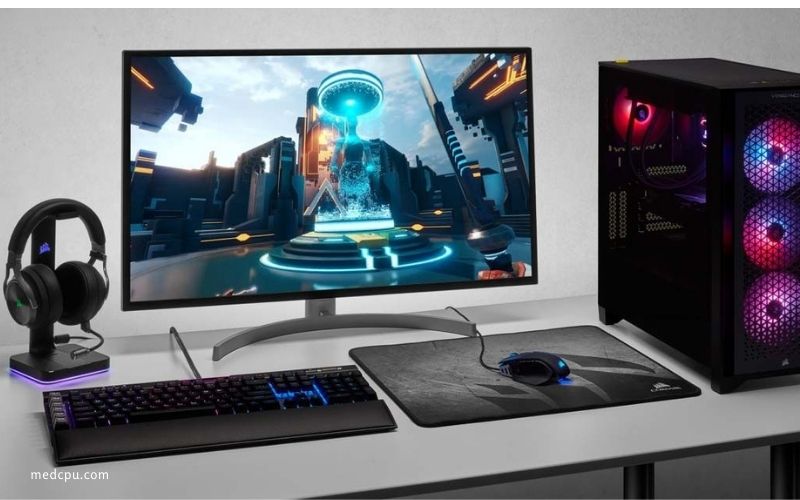Laptops and desktops are two different beasts. They each have their own advantages: laptops are portable, while desktops provide a lot more power. However, there is a debate about which one is the best choice for gaming.
In this post, medCPU will discuss everything you need to know about Gaming Laptop vs Desktop PC with their pros and cons to help you make an informed decision on what’s right for you!
What is a Gaming Laptop?

The best way to think about a gaming laptop is an everyday computer that has certain features designed for a hardcore gamer. In general, most gaming laptops have lower performance levels than desktops because they have to power all of their components using a battery (which provides less energy).
This means you’ll need more powerful hardware in your laptop than on your gaming pc… but also creates the opportunity for a better graphics card and CPUs.
Pros of Gaming Laptop:
– Portable
– Quality graphics card and CPUs
Cons of Gaming Laptop:
– Lower performance levels than desktops due to battery limitations. If you want a great gaming experience, you’ll need more powerful hardware in your laptop compared with your gaming pc.
See our list of the Best Gaming Laptop Under 2000, Click here.
What is a Gaming Desktop?

Gaming Desktops are computers that have been designed for most gamers. They come with high-performance levels, and CPUs, which is why they’re the computer of choice for hardcore gamers around the world!
Pros of Gaming Desktop:
– High-performance levels
– Quality Graphics Card & CPUs
Cons of Gaming Desktop:
– Have to be plugged in (no battery limitations) so you may not want one if you plan on taking it out a lot or traveling often. Also, because these computers are made specifically for gaming purposes, they can cost more than an average laptop or desktop.
Comparing gaming laptop vs desktop
Laptop vs desktop: Performance
Even at its most powerful, a gaming laptop is still a smaller version of a gaming computer. The size difference between the two is not detrimental to portability. Laptops are equipped with mobile versions that can be used in conjunction with desktop processors. Additionally, the parts of laptops are contained within their bodies, so they have less airflow than desktops.
On the other hand, gaming PCs will have more space, regardless of whether you need to add components or store more. And their parts will have better airflow. Gaming laptops and desktops have a fundamental difference in performance due to the differences in their GPUs.
Many gaming laptops may have mobile versions of processors from AMD or Intel, but they are not comparable to their desktop counterparts. The GTX 980M will not give you the same performance level as the GTX 980M. This is because the GTX 980M will overheat and slow down. While some laptops have dual GPU options, you can get a gaming pc with more cores and an eight-core CPU.
Overheating is a major problem with gaming laptops. Gaming laptops can heat up quickly, even with powerful fans and built-in cooling pads. This is due to the amount of power that gaming uses on your gaming system. It is a simple fact that laptops cannot withstand heavy hardware usage for extended periods.
Performance and speed are unbeatable. A gaming PC will always offer a better experience than a laptop.
Gaming laptop vs desktop: Portability

When comparing gaming laptops vs desktops, the first thing to consider is whether you prefer a smaller, heavier, but more customizable, computer.
Gaming Laptop
A laptop’s primary strength is its portability. The best laptop will allow you to do almost everything you can with a desktop.
This flexibility is especially important for someone who travels a lot. The latest laptops are smaller than ever so they can be used wherever you would (or should) normally take a desktop.
Most gaming laptops often come with high-end hardware, which allows you to play AAA and competitive games wherever you are.
Laptops are powered by a battery. They also come with a display and a keyboard. However, you can create a desktop experience at home using the right peripherals. Although it can increase the versatility of your laptop, additional equipment such as docking stations and keyboards or external gaming displays may be more expensive than the initial purchase.
Desktop
On the other hand, desktop computers are larger and more portable than laptops. Even the smallest form factor desktops will require power outlets and monitors. While some people are happy to transport a whole tower to special events like LAN parties, most desktop users limit their experience to one location.
The desktops could also offer extensive I/O support or the ability to connect other devices. This is generally available through the motherboard and expansion slots devices connected via PCIe*. You may find additional connectivity options such as front-facing USB or audio ports in the case. This allows for support for multiple monitors and non-standard peripherals. It also offers different USB connectivity options.
Gaming laptop vs desktop: Peripherals
It is important to note that laptops can have built-in keyboards, displays, and touchpads. This can either be a good thing or a problem.
You don’t need to spend extra on any of these, but what if your current setup isn’t working for you? If you’re looking for a high-end gaming monitor with a 144Hz refresh rate or a mechanical keyboard, the accessories that come with your laptop will only add to the cost of the device.
Display – Most gaming laptops feature Full HD screens with 60Hz refresh rates and a 15- to 17-inch diagonal. It is easy to understand the screen size if your laptop needs to be carried in a bag. However, a monitor will be necessary if your eyes are set on higher resolutions or refresh rates.
Keyboard – Laptops use regular low-profile membrane keys. It is rare to find a mechanical keyboard with built-in backlighting.
Touchpad/Mouse – Anyone who has used one knows that they are very inconvenient for gaming. If you plan to use your mouse exclusively with your gaming laptop, then you’ll need to purchase a separate mouse.
Microphone and Speakers – Gaming laptops come with microphones and speakers built-in. If you prefer headphones, you don’t have to worry about buying a headset or a dedicated mic.
Upgradability
Although the desktop did not win the value category, getting the most out of your hardware with a standards-based PC is possible. After a computer’s life span has expired or is no longer needed, you can almost always upgrade it.
Gaming laptops are more easily upgradable than other laptops. However, even then, you can only increase the RAM or storage. Most motherboards have the CPU and GPU integrated into them, making upgrades difficult. Thunderbolt is an option on some Intel-based laptops, but it’s unlikely that you would want to use this feature.
Since very few people make significant upgrades, only the long-term thinkers who care about upgrading can do so. Desktop computers are still the most important.
Customization

Laptop
You can usually choose from a variety of core components when you buy a laptop. These include the RAM and storage, as well as the CPU and GPU.
You might have some flexibility in fine-tuning performance, but, for the most part, you will be using the same hardware from the time you purchase it until the day you replace it.
This is also true for your laptop’s visual design. Although there is more variety than ever, you can still choose from pre-existing forms with limited customization options like keyboard backlighting and custom paint jobs.
See also Office Chair Vs Gaming Chair Comparison, Click here.
Desktop
Customization is one of the biggest draws on desktops. You can easily swap out hardware to be sure that you have exactly what you want and nothing you don’t. A desktop provides:
There are many options for custom hardware. You can have complete control over the hardware in your gaming system.
Highly controlled performance. You can customize hardware to make sure your computer runs at its best. A desktop computer has more surface area than a laptop, which means that it can be used for cooling.
There are many options for cooling solutions, including fans and All-in-One CPU coolers. You also have the option to create custom cooling loops to provide customized thermal solutions that meet your hardware needs.
There are more aesthetic options. You have more aesthetic options with desktops. You can choose from different sizes, brands, and specifications for each component of your computer. You can customize the performance of your computer with cooling solutions and hardware that are carefully chosen. But, you can also make your vision come to life by creating a visually distinctive machine.
Pre-built PCs are still available for those who prefer customization. You can choose the contents of your new computer before some vendors assemble it. This allows you to enjoy the advantages of a home-built gaming system, even though you did not build it.
Click here to read also our comparison between Laptop vs Tablet.
Storage
Most laptops have lower amounts of RAM than desktops. Some laptops allow you to add RAM modules, but this can be tricky.
It is challenging to access the RAM slots on laptops. Gaming or not, it is impossible to remove the base of the laptop. This is not only dangerous, but it can also cause damage to your laptop’s warranty. It is not something you want to do with a high-end gaming laptop.
Another problem with laptops in terms of storage is their size. You can’t install additional Hard drives (HDDs) or SSDs. There are always options to either replace the HDD/SSD or use external storage.
On the other hand, a desktop has multiple SATA ports that allow you to add more storage, such as HDDs and SSDs. This allows you to enjoy a better gaming experience.
Display
Displays on gaming laptops have a limited size. They can be anywhere from 13 to 17.5 inches. Gaming desktops can accommodate any size and resolution monitor or television. A gaming desktop offers the same quality and resolution options as laptops. High refresh rates are a common feature of laptop displays, making them ideal for first-person shooter competitions. These refresh rates range from 120HZ to 360Hz.
The best image quality is achieved when gaming laptops and desktops are close-up or at an angle. Gaming laptops are usually equipped with 1080p or1440p displays. This allows games to run smoothly while still maintaining a high-quality image.
Due to the higher performance of desktop graphics cards, gaming desktops are better suited for 4K resolution gaming. While some laptops come with 4K displays, gaming at 4K is not recommended due to the thermal limitations of mobile GPUs.
Touchpad
Anyone who has used a gaming laptop knows how frustrating it is to use a touchpad. This applies regardless of whether you’re playing fast-paced shooting, click-and-drag, or strategy games. If you only plan to use a mouse with your gaming laptop, you will still need a mouse.
External CPUs, such as Intel Core, can change the picture dramatically. All you need is a small processor and your keyboard and mouse. As long as you have a screen to play from, it’s okay.
Keyboard
Some laptops with high-end features have a mechanical keyboard that lasts longer than traditional membrane keyboards. A laptop’s keyboard cannot be replaced or upgraded, which can lead to problems if they become worn out. The keyboard options for desktops are vast.
They can be customized with RGB lighting or macro keys, and come in basic membrane keyboards as well as custom-built mechanical keyboards. To extend the life of your membrane keyboard, gaming laptops are equipped with them. These membrane keyboards come with RGB lighting that allows for customization and aesthetics.
Read also: How to build your own gaming laptop? 2022
Gaming laptop vs desktop: What is the Cost?
It’s challenging to compare a gaming laptop with a desktop because of the large number of configurations and the high cost of components. However, a quick look at a few examples can help you see some trends.
We compared several machines in the G series of Dell’s that are close to entry-level.
| Dell G3 15 Gaming Laptop | Dell G5 Gaming Desktop | |
|---|---|---|
| Price as configured | $1,049.99 | $849.99 |
| CPU | Intel Core i5-9300H | Intel Core i5-9400 |
| GPU | Nvidia GeForce GTX 1660 Ti Max-Q | Nvidia GeForce GTX 1660 Ti |
| RAM | 8GB DDR4 2666 MHz | 8GB DDR4 2666 MHz |
| Storage | 512GB M.2 NVMe SSD | 1TB 7200-rpm SATA HDD |
| Display | 15.6-inch, 1920 x 1080 | N/A |
The gaming desktop is $200 cheaper than the laptop, which comes with a 9th Generation Intel Core i5 processor, GTX 1660T (the laptop has a Max Q version), and 8GB RAM. However, the laptop gets dual-channel RAM, while the desktop sticks with single-channel RAM. The desktop is twice as big as the laptop but has a slower and more clunky spinning hard drive.
This desktop is even more affordable at $679.99 for a Core 9100 and GTX 1660Super with the same RAM, storage, and storage. This laptop is cheaper because it uses parts from the last generation.
However, the initial cost of a desktop is higher than expected. You will need a monitor, especially a high-quality one. The keyboard and mouse that come with prebuilt are inferior. These will not come with any of the items you build. You may also need headphones or speakers. The screen, speakers, and keyboard come with a laptop. You will need a mouse and headphones for gaming. However, the screen is not as large as a desktop monitor.
Pre-built desktops have a higher labor cost. You could save money and get better components if you build it yourself. This is the one we made on paper to compare it to the Dell G5:
| Price | $843.92 |
|---|---|
| CPU | Intel Core i5-9400 |
| CPU Cooler | Cooler Master Hyper 212 RGB Black Edition |
| GPU | EVGA GeForce GTX 1660 Ti XC Black Gaming |
| Motherboard | ASRock B365M Pro4 Micro ATX |
| RAM | Corsair Vengeance LPX 8 GB (2 x 4 GB) DDR4-3000 Memory |
| Storage | Crucial P1 1TB M.2-2280 NVMe SSD |
| PSU | EVGA BR 500 W 80+ Bronze Certified |
| Case | Fractal Design Focus G Mini |
Prices fluctuate, and you can put more money in any part. We had the same CPU, GPU, dual-channel RAM, faster RAM, and the same storage in NVMe SSD. But we still had enough money to buy a cooler.
There are many deals available if you are looking for a laptop. Gaming laptops equipped with Nvidia GeForce RTX 2060 will drop to $999 over the next few months. However, a desktop still holds the most value in computing power and computing performance, at least before you purchase peripherals.
Read also: Laptop Gpu Vs Desktop Gpu – Which Is Better And Why? 2022
FAQs about gaming laptop vs desktop
Does a gaming laptop run hotter than a desktop PC?
It’s debatable whether gaming laptops run hotter or colder than desktop gaming pcs. The important thing to note is that their performance levels are different: laptop components have a low power supply, meaning they produce less heat.
If you plan on playing for hours at a time, your laptop may start to overheat because of this design issue – and the problem will only get worse if it’s plugged in while also being played with!
Is 95 too hot for CPU?
95 is not too hot for CPU, but it will be tougher to keep the laptop from overheating if you plan on playing games or running programs that require a lot of power.
The problem with these devices being plugged in and played at the same time is they use up more battery life – so when your computer starts heating up because of this design flaw, you’ll have less energy available to solve the issue!
Can a gaming laptop really compete?
Because of their reputation, PC gamers have avoided gaming laptops for a long time. Gaming laptops used mobile-specific chips that were far less powerful than desktop-grade components before the CPU and GPU power efficiency advances.
For the same gaming performance, the price of older gaming laptops was much lower than that of gaming rigs.
As the price and performance of gaming laptops have become more comparable to desktops, the stigma surrounding them has been dramatically reduced.
Although the price gap and gaming experience between them has been less, there are still pros and cons to choosing between a high-end gaming laptop or a desktop computer. To help you make the perfect choice in buying a laptop or a desktop, it is essential to consider your needs and weigh the pros and cons.
Conclusion: Gaming Laptop or Desktop PC?
We hope we’ve helped shed some light on the debate between which computer type is best suited for gamers – namely by discussing everything from what each one offers to how these two devices differ when it comes to features like heat production. Ultimately, choosing either one will depend on exactly what’s most important to you on a computer and your budget.

Eyal Ephrat serves as the co-founder and CEO of medCPU.com, where technology is making significant strides in the field of medicine. Through his experience in purchasing PC and laptop equipment and various other tech products, Eyal Ephrat contributes valuable insights to medCPU’s mission.
